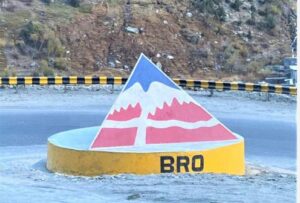CSIR-CRRI’s New REJUPAVE Technology in Arunachal Pradesh : India’s leading road construction agency, Border Roads Organization (BRO), has effectively employed an innovative road construction technology known as “REJUPAVE,” developed by the CSIR-Central Road Research Institute (CSIR-CRRI) under the Ministry of Science and Technology. This indigenous solution has proven instrumental in constructing high-altitude bituminous roads in the challenging terrains of Arunachal Pradesh, where low and sub-zero temperatures prevail.
The application of REJUPAVE marked a significant milestone for BRO during the construction of segments of the renowned Sela Road Tunnel, the world’s highest, and the LGG-Damteng-Yangste (LDY) road near the China border in Arunachal Pradesh.
Challenges in High-Altitude Bituminous Road Construction
The construction and maintenance of bituminous roads at high altitudes, especially in the harsh winter conditions of Arunachal Pradesh, have traditionally posed formidable challenges for the Border Roads Organization. Winter months often bring construction to a standstill or cause delays due to the difficulty in producing and maintaining hot bituminous mix. The conventional process involves heating the mix to 160-170°C in a hot mix plant, and maintaining its temperature during transport to the work site for proper compaction. However, the prolonged travel time along hilly roads results in rapid cooling, hindering effective paving.
How REJUPAVE Overcomes Winter Construction Challenges
REJUPAVE employs innovative strategies to address the challenges presented by freezing temperatures.
To enhance heat retention, the technology incorporates special hydrocarbon-based additives that coat the aggregate mix. This coating enables the mix to remain sufficiently hot, even during extended transportation from the hot mix plant to remote work sites.
A unique construction sequence called Pre-Fab paving is facilitated, wherein a base layer is paved and allowed to cool and set completely before overlaying with the top hot bituminous layer.
Special dominant stone skeleton gradations are utilized, providing better resistance to deformation under rolling/compaction at relatively cold temperatures. This feature makes placement and compaction easier.
What Are Benefits after Successful Deployments?
BRO’s successful implementation of CSIR-CRRI’s New REJUPAVE Technology in Arunachal Pradesh has expedited crucial strategic road projects that would typically face disruptions during the prolonged winter period. The technology has demonstrated superior long-term road performance, overcoming challenges posed by steep gradients, adverse weather conditions, and sub-zero temperatures.
The widespread adoption of this cost-effective indigenous technology, developed by Indian scientists, holds the potential to revolutionize construction schedules for strategic infrastructure along northern borders. This could enhance all-weather connectivity for defense forces and border populations while reducing reliance on foreign solutions.
About BRO
The Border Roads Organisation (BRO) is a statutory body. It comes under the ownership of the Ministry of Defence of the Government of India. BRO develops and maintains road networks in Border areas of India. It also operates in friendly neighboring countries. This includes infrastructure operations in 19 states and three union territories (including Andaman and Nicobar Islands) and neighboring countries such as Afghanistan, Bhutan, Myanmar, Tajikistan and Sri Lanka.
By 2022, BRO record of making 55,000 kilometres (34,000 mi) of roads. Along with constrictions, BRO is also tasked with maintaining this infrastructure including operations such as snow clearance.
Get more Current Affairs here.


